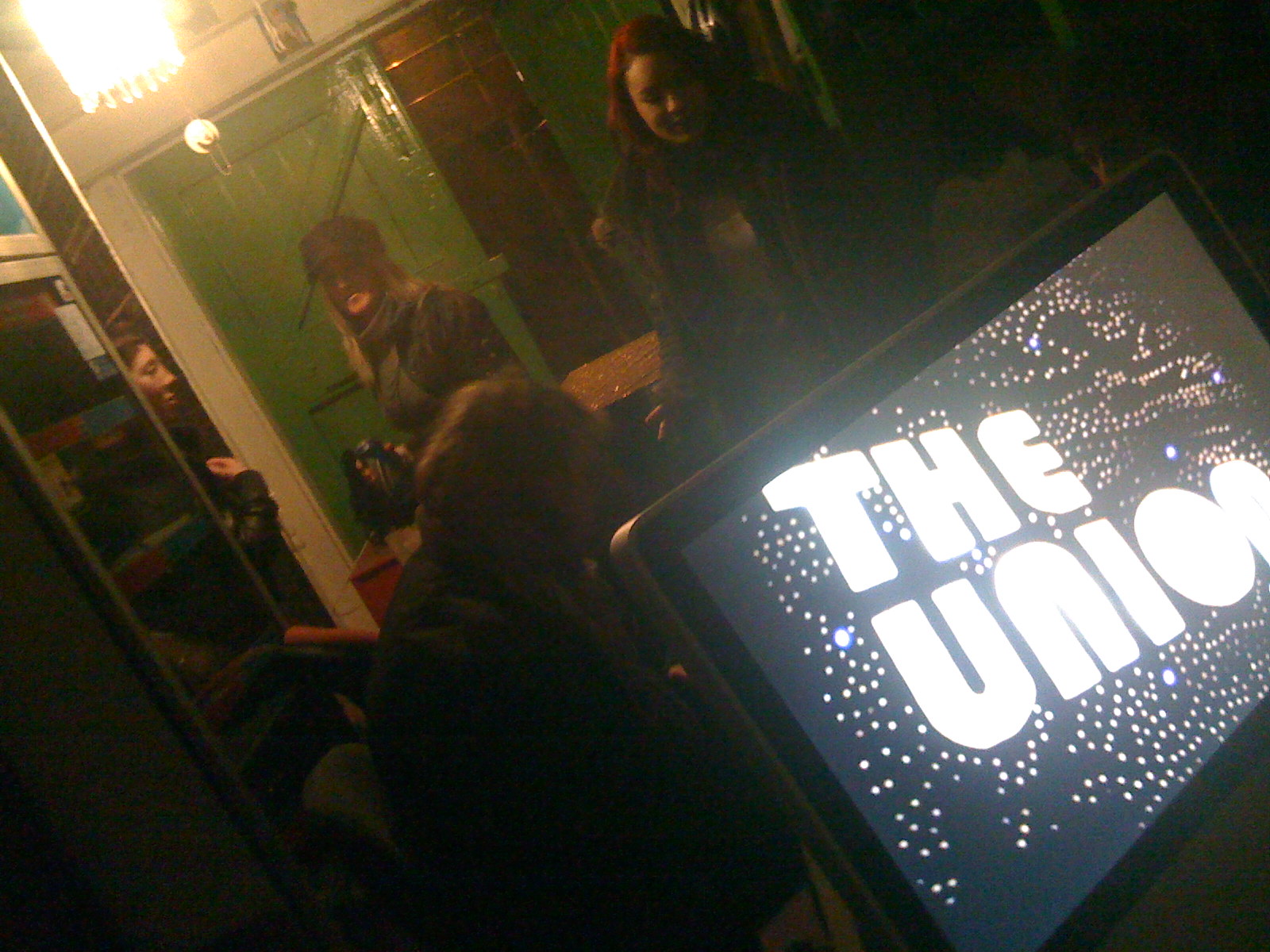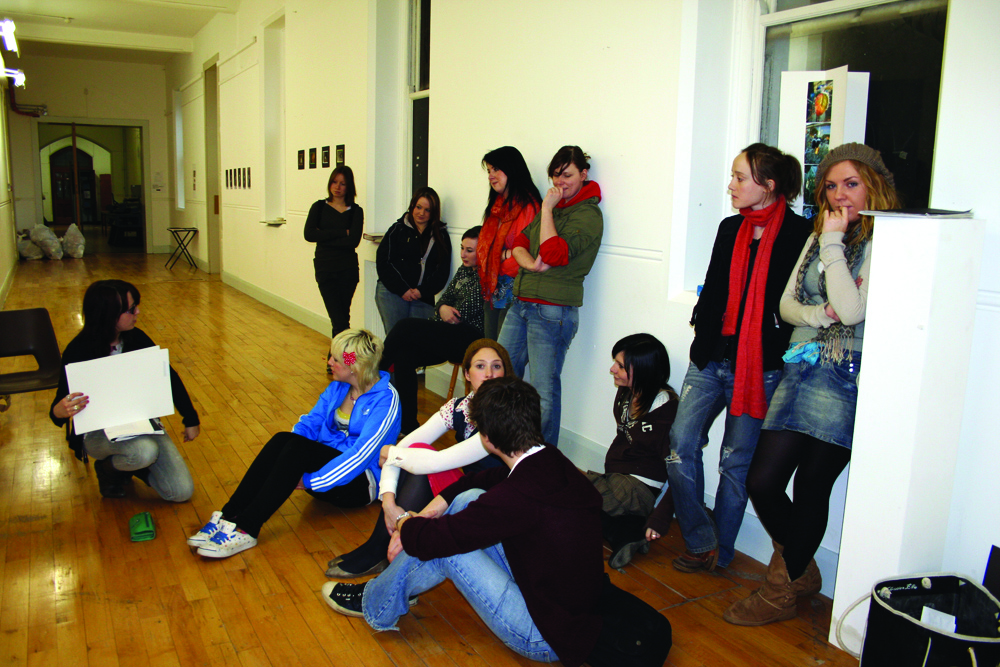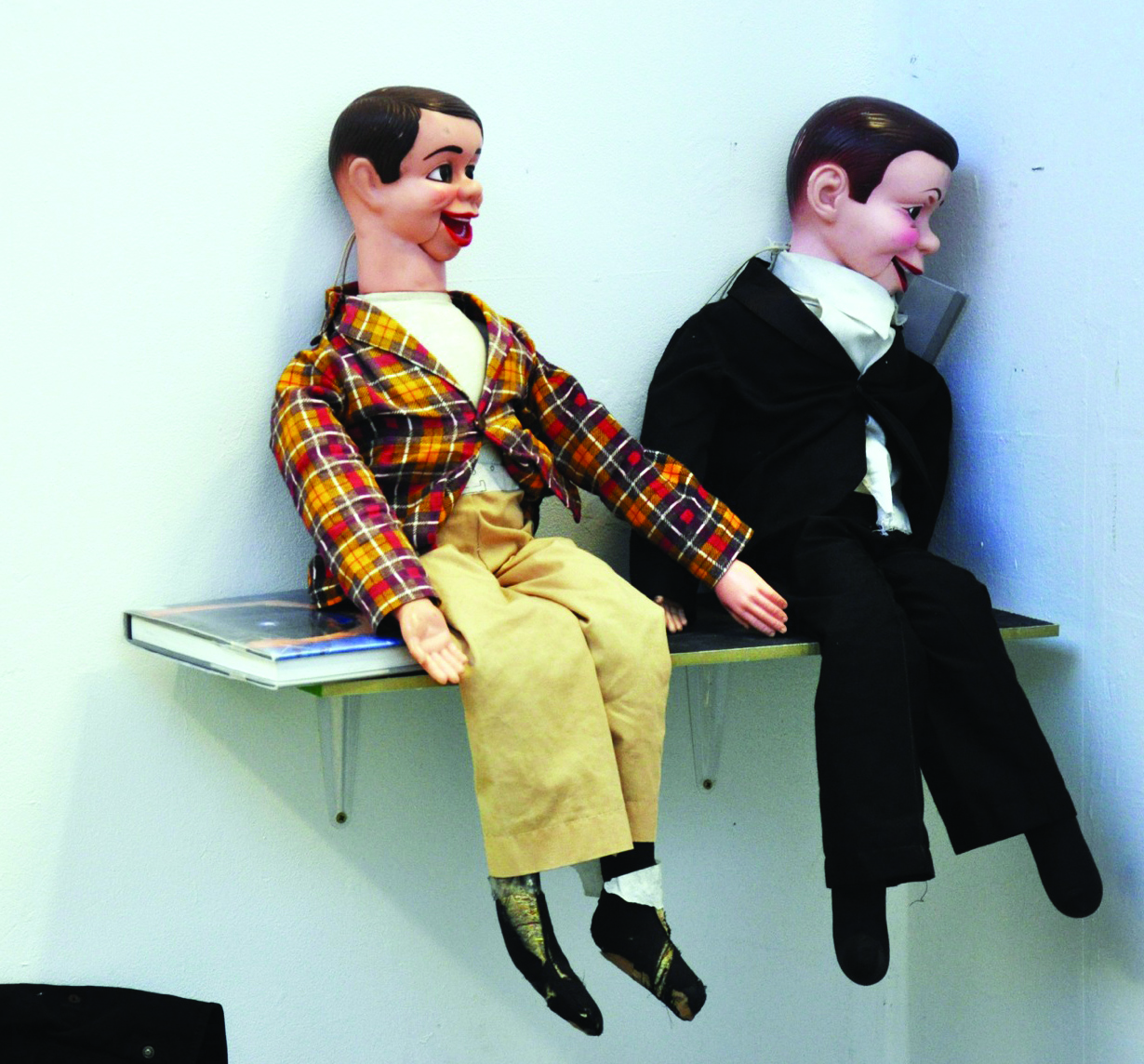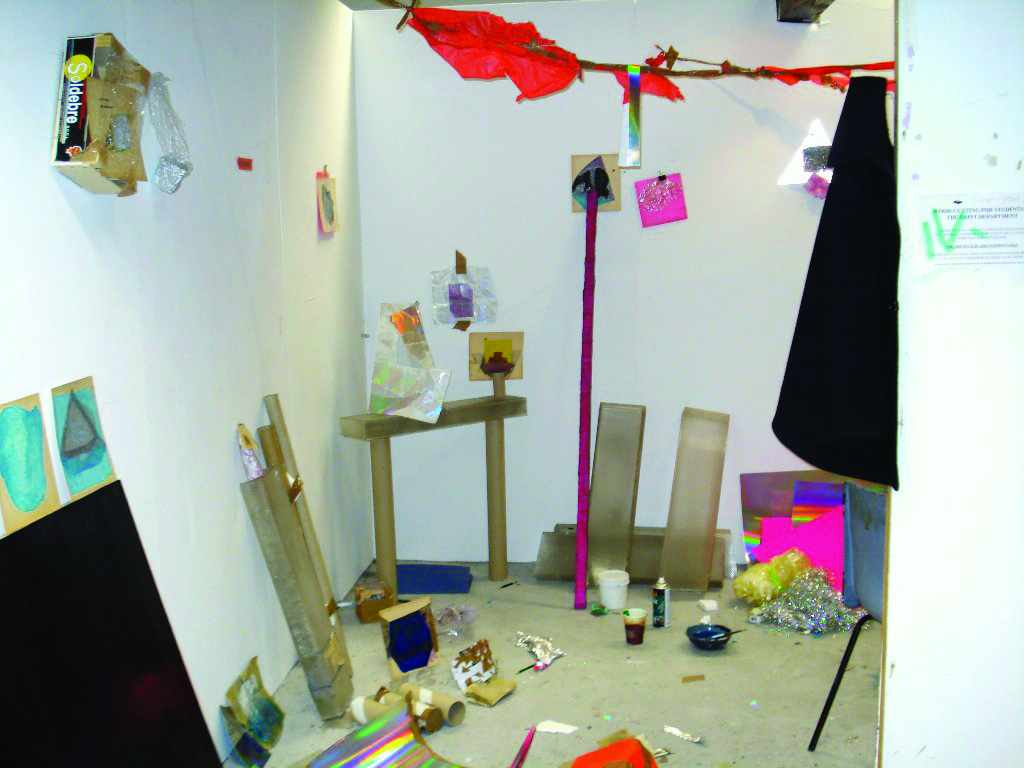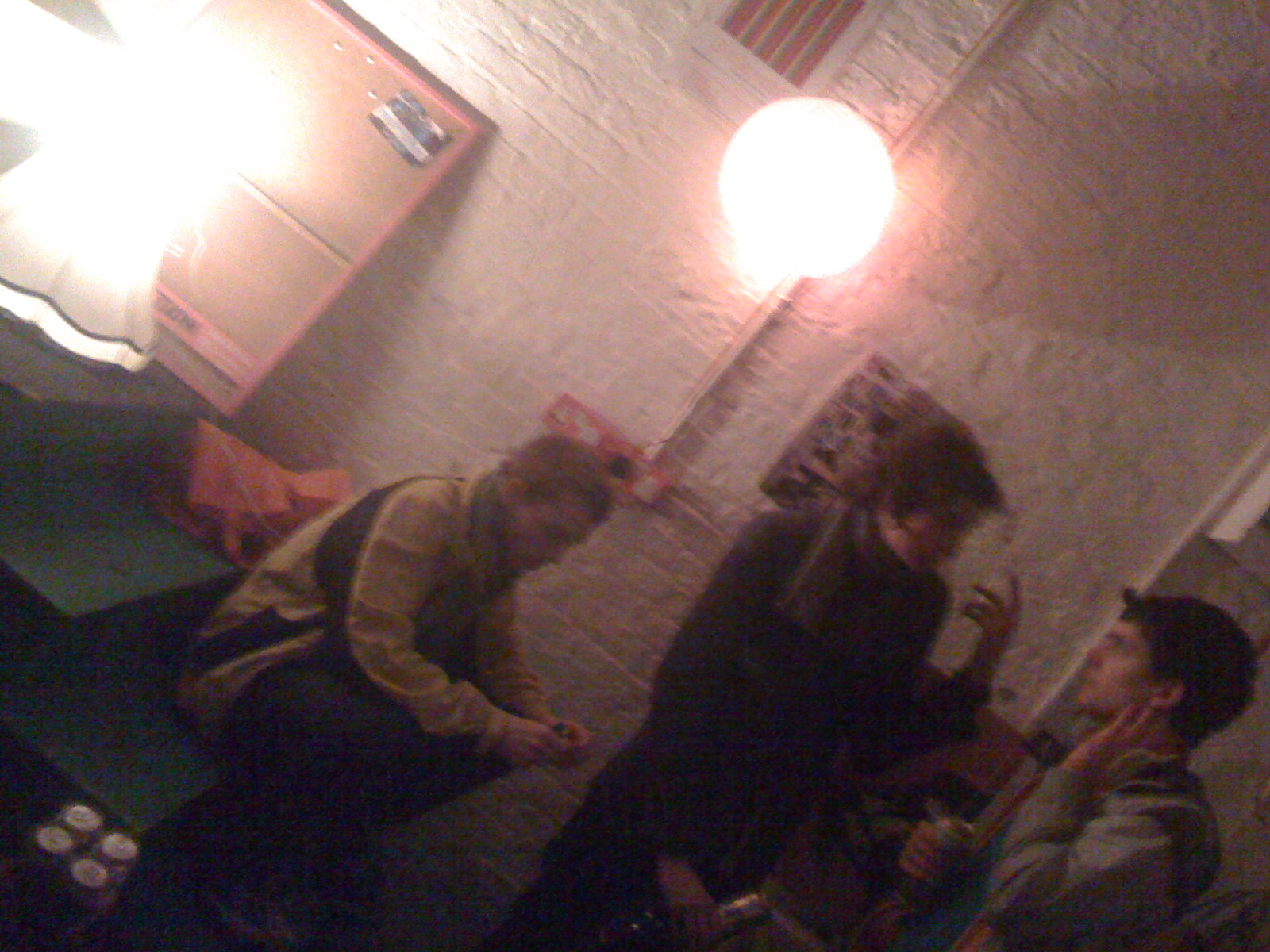Amie Lawless has approached Student Unions around Ireland, to see how they service the needs of art students. This is her report.
The need for this questionnaire came about after a series of online surveys was completed on our website. Three hundred and fifty art students answered questions about their art-college experience. It was clear from the responses that many students were very ambivalent towards their Student Unions (SUs).
In an attempt to shed some light on the role and function of SUs in art colleges, especially in relation to art students and their well being, a questionnaire was compiled at Circa and sent to the following art colleges in Ireland: Burren College of Art (BCA), Cork Institute of Technology (CIT – Crawford College of Art), Dublin Institute of Technology (DIT), Galway Mayo Institute of Technology (GMIT), Dún Laoghaire Institue of Art, Design and Technology (IADT), Limerick Institute of Technology (LIT – Limerick School of Art and Design – LSAD), National College of Art and Design (NCAD), Institute of Technology Sligo (ITS), and University of Ulster (UU).
These are the unedited responses to the questionnaire from each of the colleges:
BCA: Student Union is not in existence.
CIT: Adam O’Brien, Student Union Vice-President/ Education Officer.
Does the SU have any specific procedures in place for assisting students in difficulty? Eg. Problems with courses, tutors, bullying or harassment etc?
AO’B: Yes, we do – I am the Educational officer which requires me to handle any academic issues such the first two points. There are procedures in place which mean that I facilitate communication between students and lecturers and I act as an intermediary. If an individual student or even a class are having problems, I liaise with them and the lecturer/head of department/ relevant persons. For the latter two points, we have a Welfare Officer – Thomas Lynch, who handles issues of well being, bullying, etc, and as far as I know, he is there to talk to the students and help them in any way he can by recommending various services – either in college or outside. This is mainly because as the Welfare Officer, while a full time position – he is not truly qualified to provide complex services of, say – a counsellor or psychologist.
If these procedures exist are the student body aware of them and are they able to access the information concerning these procedures?
AO’B: I hope they are: we try every year, with each new Students’ Union executive to inform the students of the services available and talk/converse/hang out with a multitude of students on campus. Accessing the procedures just begins with conversing with a member of the Students’ Union and we will help them in whatever way necessary – this is helped by being able to hang out with various students and creating that relaxed, ‘you can approach me’ atmosphere.
Are these issues kept on file?
AO’B: Yes and no. I can speak for myself with authority that, within the role of Education officer, the recording of casework provided an all too easy access into students confidential issues. It used to be done and the files kept on the computers with specific passwords as with other confidential documents/files on the computer. I stopped doing it because I felt that it was not fully necessary to keep such records and because of possible security issues.
If a record exists how is the affected student protected from this vulnerable information from leaking to the student body?
AO’B: As with above, there are security issues and the computers in the Students’ Union are in constant use – sometimes by students themselves (completing projects, etc.) so I felt it was no viable.
Is the SU an approachable body in terms of an individual student in need of help?
AO’B: Again, I would hope so. I am a graduate from Crawford and I would know most of the student body on that campus and I know many students personally on the Bishopstown campus as well. We try to inform everyone of the services that we provide and there is generally a stream of students in and out of the SU office. We traverse the campus regularly and some of us are apart of societies and clubs which increases our ‘connect ability’ or approachableness of the officers within the Union. We operate a class representative system and get to know them from the beginning of the year, so this makes it easier for students to find out what we do through their class reps.
How does the SU gauge that it is meeting the students’ needs?
AO’B: We have meetings approx. once a month with the students and class reps and see what the problems are. It is hard to gauge how well we are meeting with the students needs but it is rarely that a students problem persists in CIT. We can gauge that if a student/class is continually coming back with a problem; it would then be classed as a serious problem and would become first priority. I haven’t seen this happen this year at all, problems are usually dealt with within a matter of hours or days depending on communication with lecturers or administration.
Does the SU communicate well with the faculty and board in order to be heard?
I believe so. All three Sabbatical officers within CITSU are apart of many committees and organisations within the college and we communicate with lecturers on a daily basis – either through researching issues/problems or student enquiries so we have that sort of rapport with the staff. We are never afraid to call up or email a member of faculty or admin and we are responded to, in kind.
Is it possible for the SU to represent an individual student’s concerns to the faculties and board?
AO’B: Yes. The circumstances of what concerns they are to which board come into play but yes, we are able to – sometimes concerns that may affect a class or course can come from an individual student and for an individual students concerns, yes of course – whatever the case may be.
Are there any procedures or training at the beginning of each unions term to create continuity despite the yearly turnover of officers – to create an SU memory?
AO’B: I like the term SU memory. There is a crossover period with the previous executive and the new during the first week of June. It is a non-compulsory week where the old officers walk through the procedures and issues that may arise every year. Each year, the new executive could have their own agenda and there is continuity because the same large issues can be tabled every year and the work that the previous executive would have been recorded and called upon when needed. We have a great relationship with previous executives and we can call each other up whenever needed to get the full story.
Is there a representative for the separate Art campus and Art students within the SU?
AO’B: Yes there is. Crawford used to be an autonomous Students’ Union up until the end of the academic year 04/05 when we chose to join with CITSU in favour of greater representation, etc. It was agreed upon that there would be a site president position retained and this year it is a 3rd year student – Lydia McGrath, who was elected to this position a few weeks ago. I was the obvious representative from the beginning of the year and dealt directly with any queries from the Crawford and tried to be on hand in the college once a week.
So yeah, to finish – I’m sort of in the same boat as you coming from an art college and having a positive experience with the Students’ Union within Crawford and CIT. I never held a position in Crawford but was the unofficial Vice president J because I knew so many people and was able to relay that information to the right people. You can never really know what goes on within any Students’ Union unless you re actually an officer or there 24/7 because as the saying goes – students only see 10% of what actually goes on – taking out the members going to meetings, events and dealing with other students concerns, etc.
I hope that the information helps you in any way.
I can point you in a good direction. The Crawford used to be apart of USI during the 90’s (not anymore and neither is CIT) and whilst going through some files in the Crawford SU I came across something very interesting: there used to be a working group of the art colleges of Ireland that would get together and complain and/or share ideas with the view to approach the relevant authorities with recommendations for course correction, upgrade of facilities (new buildings) etc. It would be interesting to check out. I am thinking of approaching the other art college SU’s with the idea of revitalising the idea.
•
DIT: Martin Dunne, Student Union President.
Does the SU have any specific procedures in place for assisting students in difficulty? – eg problems with courses, tutors, bullying or harassment etc?
MD: DIT Student’s Union operates both a Student Affairs and an Academic Affairs department which specialise in dealing with issues ranging from physical, sexual & mental health, accommodation, employment, finance, academic complaints & queries, etc. In general when a student first contacts the union or walks into the office the issue will be noted and if it is a minor query/problem it can be dealt with on the spot by our frontline Student Support Advisors. If the issue is more complicated and requires more in-depth assistance it is passed to the relevant manager in Student or Academic Affairs and the Vice-President for those areas within the union. We offer whatever assistance we can in these areas including referrals to internal or external bodies who have greater expertise in a given area.
If these SU procedures exist, are the student body aware of them and are they able to access the information concerning these procedures? Is information disseminated about the procedures?
MD: We do our best to advertise the various services and assistance which we can render to students but don’t seek to advertise the internal processes we would utilise to handle various problems. There would be a good perception within the student populace as a whole and many students would recognise the students’ Union as a first port of call for their issues.
Are these issues kept on file?
MD: Short issues (those that are dealt with immediately in the office) are only recorded so far as tracking footfall in the office, a simple tabulation of various query areas & number of queries per month. Longer term issues that may require one or more follow-up meetings are tracked via casework files which are kept by the department dealing with the issue and allow the background information & current decisions/status to be tracked. These files would be private to only to those working on the given case.
If a record exists, how is the affected student protected from this vulnerable information from leaking to the student body?
MD: The records are kept in locked offices and all such files are treated as strictly confidential. In general only the full-time elected officer or staff members who are actually working on a given case would have access to the casework file and various details.
Is the SU an approachable body in terms of an individual student in need of help?
MD: We like to think that the SU is an approachable body and we operate under an open door policy to try and facilitate this. We are also open to student suggestions on how to improve the accessibility of the union.
How does the SU gauge that it is meeting the students’ needs?
MD: We operate a regular statistically relevant survey of the membership, aiming to get the student opinion on any given subject. Also via our democratic structures (class rep meetings, governing council, etc) any thoughts, ideas, suggestions or concerns can be raised.
Does the SU communicate well with the faculty and board in order to be heard?
As a Students’ Union we have a seat on every committee within DIT and are treated as equal members around the table. We can often be vocally heard if there is a proposal that is in the student interest!
Does the College allow the SU to be effective in representing students’ concerns?
MD: Yes. The college doesn’t hamper the access of the Students’ Union to the student body and in many cases is open to hearing the opinions of the union.
Is it possible for the SU to represent an individual student’s concerns to the faculties and board?
MD: If students are facing appeals or disciplinary hearings we are available to lend support and, if requested by the student, we can attend the meeting with them as representatives.
Are there any procedures or training at the beginning of each Union’s term to create continuity despite the yearly turnover of officers – to create an SU memory?
MD: We have a vast amount of organisational memory in the form of the many staff members who are employed by the union to assist in implementing the policies and mandates of our governing council. Newly elected officers also have a two-week cross-over period with their counter-parts and go through additional training in various areas (communications, project management, effective support, etc) throughout the year.
Is there a representative for the separate Art campus and Art students within the SU? (answer if applicable)
MD: There is no representative specifically for Art Students however each class elects students union class representatives who can act as a liaison with individual lecturers and can raise issues and concerns with the union. Class Representatives also receive training at the start of each year to assist in them in their roles.
•
GMIT: Patrick Bonner, Student Union President. No response received.
IADT: Ciara McIlraith, Student Union President
Does the SU have any specific procedures in place for assisting students in difficulty? Eg. Problems with courses, tutors, bullying or harassment ect?
CMI: Our SU has 6 officers; 2 Full time, 1)President & 2)Deputy, Welfare & Equality officer.
Then there are 4 part time; 1) Entertainment officer 2) Education officer 3) Clubs and Socs officer 4) communications officer.
So depending on the students problem or issue they would go to the relevant officer. For academic problems e.g. CA results, appeals procedures, problems with lecturers they would go to the Education officer. Problems with grants, bullying, access or learning difficulties would go to the Welfare officer. Issues around head management, estates, parking or legislation issues would come to me (president). Each officer deals with the relevant staff and personnel in the Institute to resolve or highlight the issue.
If these procedures exist are the student body aware of them and are they able to access the information concerning these procedures?
CMI: As much as you tell students and provide all the information you can, you have to drill them with it. We do the best we can, we make a handbook at the beginning of the year with information. I hold class reps meeting every two weeks and send emails constantly. I advise class reps to send on any important information to their class lists. This is say 50% successful as some class reps are great others just not as involved. But it’s our main consistent communication system. We also out have a magazine and newsletters with info.
Are these issues kept on file?
CMI: Filing systems are difficult as you have new SU in every year and people have their own way of doing things. But we have computer files broken down by year so we can review past Union details and issues. Within the college system and issues that are brought to meetings are noted in minutes and filed away. We also minute all our class rep meetings and file them on the computer. We have storage issues so computer filing and storing on external hard drives is the most efficient.
Luckily I am friends with the past two presidents in IADT as Intellectual property and conversation is always helpful with issues you have not dealt with before.
If a record exists how is the affected student protected from this vulnerable information from leaking to the student body?
CMI: All case work done by the student union is dealt with the upmost professionalism and privacy. All our computers have passwords and filing cabinets locked. We are controlled by a constitution and are accountable for any mis-information. We are autonomous from the college and the students are the only people who can fire us by mandating us to step down. There has been case work in the past where we shred all records once the issue has been resolved in particularly sensitive cases.
Is the SU an approachable body in terms of an individual student in need of help?
CMI: We hope so. Our door is always open and we make our faces known as much as possible. My main goal for this year was to increase a community feeling on campus (as we have very differing schools/ course within our small campus this is very important). The SU is made up of all students and organised via class reps so each students should be able to approach their class rep with an issue (or us directly) and from there they bring it to us, we give advice on smaller issues to enable the students or class rep to solve it themselves or in a case where we need to talk to academic or managerial staff to highlight the issues we do so. But students can be shy and not everybody ask for help easily so as much as we hope to the best we can no doubt some issues are not highlighted to us.
How does the SU gauge that it is meeting the students’ needs?
CMI: Class rep meetings. I have about 70- 80 reps in the college and maybe have an general attendance of 30 reps to each meeting ( this is actually a very good statistic). We hope to also hold a focus group at the end of the year on our effectiveness and areas of improvement to pass onto teh next union so they are aware of what students want.
Is it possible for the SU to represent an individual students’ concerns to the faculties and board?
CMI: Yes we have a very good relationship with members of staff and our opinions and fully received on various committees. There is SU and general student representation across college the board.
Does the SU communicate well with the faculty and board in order to be heard?
CMI: The first port of call for any issue is for the class rep to contact the class tutor. If that doesn’t solve the problem we would either represent the student or go along with the student to whoever faculty or staff member is relevant to the situation.
Are there any procedures or training at the beginning of each unions term to create continuity despite the yearly turnover of officers – to create an SU memory?
CMI: We hold a two week intensive crossover between the officer term. Old emails are a great source of information and generally past union members will take your call if needed. But you are here in the summer for two months before students come back which gives you plenty of time for research and planning. Building relationships with members of staff are also essential to understanding the workings of the institute. As members of USI (Union of Students Ireland) we also attend UOS training week for all new officers in the various roles, responsibilities and issues around the sector and job roles.
We hold Class Rep Training around November to make sure they are aware of their roles as they are integral to the Union success and effectiveness.
Is there a representative for the separate Art campus and Art students within the SU?
CMI: Not Specifically. There are 3 schools within the college. 1) Creative Arts 2) Creative Technologies 3) Business & humanities. We have class reps attend meetings where we can voice each course issue. Regularly I only send emails to the creative arts reps if its arts info only relevant to them but it’s a interesting idea to have one main rep from each school. Maybe I’ll do that.
But any rep or student is free to drop into the office for advice or help.
•
LIT: Peter Moloney, Student Union President
Does the SU have any specific procedures in place for assisting students in difficulty? Eg, Problems with courses, tutors, bullying or harassment ect?
PM: The students union do not have a procedural document in place however the college have a dignity and respect doucment in place at the momnet
If these procedures exist are the student body aware of them and are they able to access the information concerning these procedures?
PM: All doucment are given to the students when they start college and are accessable from the college
Are these issues kept on file?
PM: From what i am aware of yes through meeting minutes
If a record exists how is the affected student protected from this vulnerable information from leaking to the student body?
PM: Mintues are kept on a database file which is protected by username and password
Is the SU an approachable body in terms of an individual student in need of help?
PM: Yes the union is apprrochable.
How does the SU gauge that it is meeting the students needs?
PM: Doing farly well i reckon dont et much feedback from students however
Does the SU communicate well with the faculty and board in order to be heard?
PM: As student union president i sit on governing body board and i would say the su has a fairly good relationship with the faculty
Is it possible for the SU to represent an individual students concerns to the faculties and board?
PM: We have pre goving body meeting with the regester and heads of student affars and services and indivdual concerns would usually get dissucs and solved at these meeting
Are there any procedures or training at the beginning of each unions term to create continuity despite the yearly turnover of officers – to create an SU memory?
PM: Usi provide a week long training during the summer and we here at lit have a student union administrator who helps with the training of new officers into there roles and has arunning fileing system to keep memory
Is there a representative for the separate Art campus and Art students within the SU?
PM: Yes Mr Alan Bennet is president and Mickey Fleming vice president.
Alan Bennet was approached to give his own response.
•
NCAD: Declan Hurley Student Union President, and Ciara Brophy Student Union Vice President.
Does the SU have any specific procedures in place for assisting students in difficulty? Eg. Problems with courses, tutors, bullying or harassment ect?
DH: There is currently no documentation outlining specific procedures. However the process for reporting difficulties is to come to the union officers (president and/or vice president) and they can represent members in negotiation with college officials, administration, the community, or fellow students.
If these procedures exist are the student body aware of them and are they able to access the information concerning these procedures?
DH: Information for accessing union assistance is distributed at the at the start of each term in the free student handbook.
Are these issues kept on file?
DH: Hard copies are kept on year based files
If a record exists how is the affected student protected from this vulnerable information from leaking to the student body?
DH: Access to the files is reserved for elected officials only.
Is the SU an approachable body in terms of an individual student in need of help?
DH: Yes and this is avidly encouraged
How does the SU gauge that it is meeting the students’ needs?
DH: through interaction with the student body. a survey of satisfaction is intended
Does the SU communicate well with the faculty and board in order to be heard?
DH: Yes, we have regular meetings with the director, registrar and various faculty boards.
Is it possible for the SU to represent an individual students’ concerns to the faculties and board?
DH: There is always a spot on the agenda of faculty boards for ‘students issues’.
Are there any procedures or training at the beginning of each unions term to create continuity despite the yearly turnover of officers – to create an SU memory?
DH: A two week handover period is in place.
•
ITS: Daniel McGarrigle, Student Union President.
Does the SU have any specific procedures in place for assisting students in difficulty? – eg problems with courses, tutors, bullying or harassment etc?
DMG: yes depending on what the specific problem is, it’s dealt with by the relevant person. An example would be, someone with a problem with a course would talk to the education officer and they would try to resolve the problem. This would all be dealt with in a confidential manner.
If these SU procedures exist, are the student body aware of them and are they able to access the information concerning these procedures?
DMG: Yes the student would be aware that they can come to the students union with any of their problems. This information would be available in our publications, web-site through the class reps.
Are these issues kept on file?
DMG: Yes
If a record exists, how is the affected student protected from this vulnerable information from leaking to the student body?
DMG: The office is operated as any office would be, with files keep on record in lock location.
Is the SU an approachable body in terms of an individual student in need of help?
DMG: Yes the student can come to the students union and we can help them or send them to the appropriate person.
How does the SU gauge that it is meeting the students’ needs?
DMG: We have regular class rep meetings which we look for feedback from the students on what we are doing and if there is anything that they feel we need to do for the students.
Does the SU communicate well with the faculty and board in order to be heard?
DMG: Yes we have regular meetings with the heads of school and other relevant persons within the college.
Does the College allow the SU to be effective in representing students’ concerns?
DMG: Yes they are we sit on most committee within the college so students views are air.
Is it possible for the SU to represent an individual student’s concerns to the faculties and board?
DMG: Yes
Are there any procedures or training at the beginning of each Union’s term to create continuity despite the yearly turnover of officers – to create an SU memory?
DMG: Yes, the Union of Students of Ireland organizes a week of relevant training. We also produce a change over manual and carry out change over training.
Is there a representative for the separate Art campus and Art students within the SU? (answer if applicable)
DMG: there would be class reps from the arts course.
•
UU: Nora Duncan, Student Union President. No response received.
Responses compiled by Amie Lawless.

